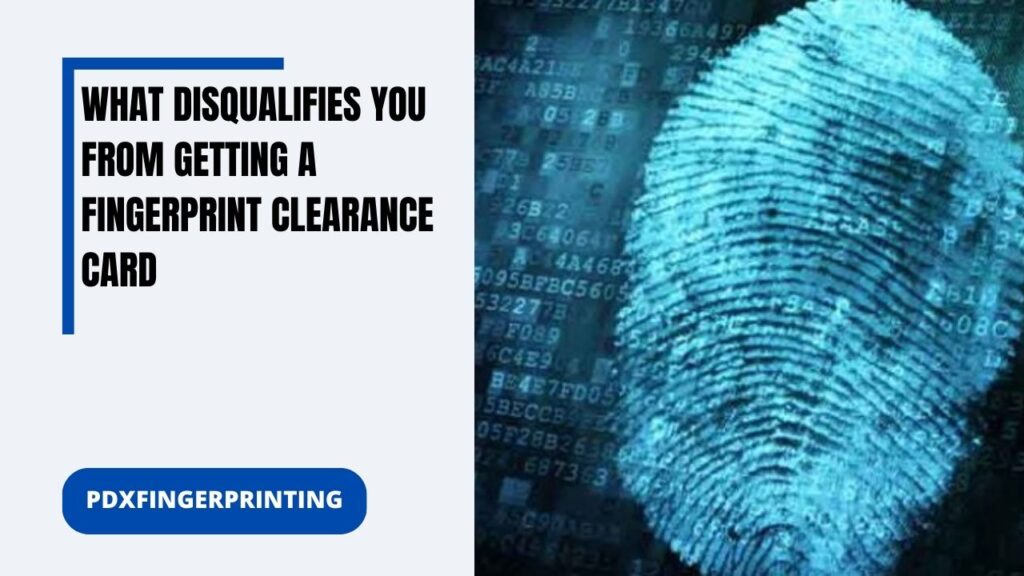When it comes to securing a Fingerprint Clearance Card, certain qualifications must be met to ensure the safety and trustworthiness of individuals in sensitive roles. Let’s delve into what factors might disqualify an individual from obtaining this vital credential and the implications it holds.
Introduction to Fingerprint Clearance Card
A Fingerprint Clearance Card serves as a badge of credibility, often required for various professions involving vulnerable populations like children, elderly, or patients. It’s a testament to an individual’s clean background, ensuring trustworthiness in roles involving public safety and security.
Basic Qualifications for a Fingerprint Clearance Card
To be eligible, you typically need to pass a criminal background check and meet the legal age requirement. Seems straightforward, right? Well, there’s more to it.
Factors That Can Disqualify You
Certain offenses can pose barriers to obtaining this clearance. Serious crimes like felonies or violent acts are clear disqualifiers. Additionally, misdemeanors related to drugs, theft, or fraud can also raise red flags. Some specific professions, like educators or healthcare professionals, have stringent guidelines due to the nature of their work.
Exceptions and Considerations
But hey, there’s hope! Rehabilitation, expungement, or case reviews can sometimes provide a second chance. Each case is unique, and exceptions may exist based on specific circumstances.
Appeal Process and Rights
If denied, you have rights. Challenging a denial is possible, and legal assistance can be instrumental in navigating this process.
Steps to Obtain a Fingerprint Clearance Card
Now, how do you actually get one? The application process involves documentation, forms, and fees. It’s a procedural journey.
Employment and Fingerprint Clearance
Having this clearance can significantly impact job opportunities, especially in sectors where it’s a mandatory requirement. Different industries have their own set of regulations regarding this clearance.
Maintaining Fingerprint Clearance
It’s not just about getting the card; you need to keep it updated. Renewal requirements and reporting changes in your status are essential.
Community Impact and Safety
The ultimate goal here is public safety. Fingerprint clearance helps maintain community trust and ensures the safety of vulnerable populations.
Conclusion
Securing a Fingerprint Clearance Card is a critical step for many professions. While certain factors might disqualify you, there’s often room for review and appeals.
FAQs
Can I Get a Fingerprint Clearance Card with a DUI?
In most cases, a single DUI (Driving Under the Influence) offense might not automatically disqualify you from obtaining a Fingerprint Clearance Card. However, multiple DUIs or DUIs involving aggravated circumstances might pose a higher risk and could affect your eligibility. It’s essential to disclose any DUI incidents during the application process and seek guidance from the relevant authorities.
Are There Time Limits on Disqualifying Offenses?
The time limits or “look-back” periods for disqualifying offenses can vary based on state regulations and the nature of the offense. For certain serious offenses, there might not be a statute of limitations, meaning they could potentially impact your eligibility indefinitely. However, misdemeanors or lesser offenses might have specific time frames after which they no longer affect your eligibility.
Does Juvenile Record Affect Fingerprint Clearance?
Juvenile records can sometimes impact the process of obtaining a Fingerprint Clearance Card, especially if the offenses were serious or violent. Some states have laws that allow for the sealing or expungement of juvenile records, which might improve the chances of obtaining clearance. However, it’s crucial to disclose any juvenile offenses during the application process.
What Happens If My Application Is Denied?
If your application for a Fingerprint Clearance Card is denied, you typically have the right to appeal the decision. The appeals process varies by state but often involves providing additional information, documentation, or even legal representation to support your case. It’s essential to understand the grounds for denial and follow the specific procedures outlined by the issuing authority.
Can I Work in Another State with a Fingerprint Clearance Card from a Different State?
In most cases, a Fingerprint Clearance Card from one state might not automatically transfer to another state. Different states have their own clearance processes and requirements, so if you plan to work in another state, you might need to apply for clearance in that specific state. Some states may consider reciprocity agreements or certain conditions for recognizing clearances from other states, but it’s advisable to check with the relevant authorities in the state where you intend to work.


